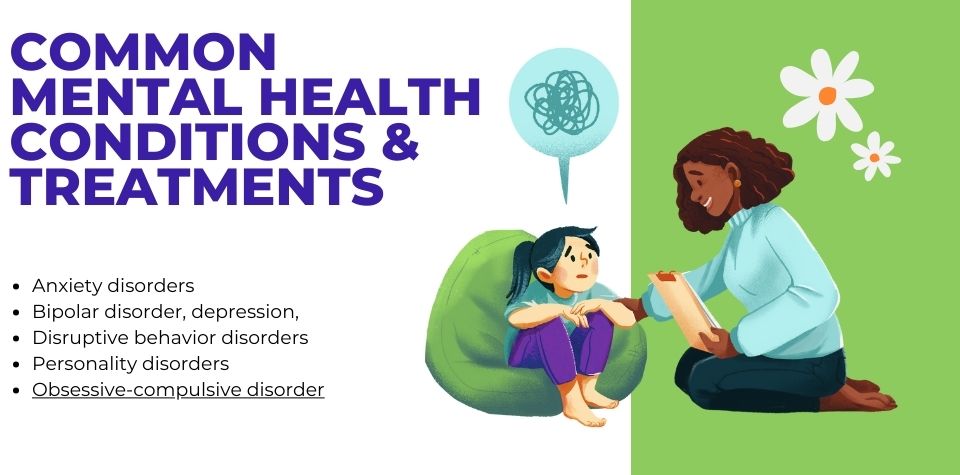To stay fit in society, we not only need physical fitness but also a good and stable mental state. Serious mental health conditions can make life worse than death.
A mental disorder occurs when you cannot control your mind or certain situations affect your life, thinking, feeling, and behavior. Over 200 types of mental health conditions exist among a significant portion of our population.
Initially, it might be hard to differentiate, but over time, they become more evident in behavior. However, in lack of education, ordinary people treat every mental health condition the same.
Different Mental Health Conditions
Before proceeding, it is essential to note that mental health disorders can be treated if addressed on time with proper medication. A bit of love and care can back a human to its normal mental condition.
Here are a few common types of mental health disorders:
- Anxiety disorders
- Bipolar disorder, depression,
- Disruptive behavior disorders
- Personality disorders
- Obsessive-compulsive disorder (OCD)
- Post-traumatic stress disorder (PTSD)
- Schizophrenia and other psychotic disorders
- Substance use disorders
- Paraphilic disorders
- Neurocognitive disorders
- Gender dysphoria
- Sexual dysfunctions
- Sleep-wake disorders
- Elimination disorders
Who Gets Mental Health Disorders?
Mental health disorders are possible in anyone, regardless of age, sex, ethnicity, or background. Emotionally unstable individuals or those with traumatic past experiences may be more susceptible to mental illness.
Studies have shown that people designated female at birth (DFAB) are more likely to experience anxiety, depression, and eating disorders.
However, these are general trends and can vary based on individual circumstances.
How Common is This Problem?
Mental illness is highly prevalent in countries like the United States, affecting approximately one in five people, CDC reports. Both adults and adolescents are significantly impacted. About half of all mental health conditions begin by age 14.
Poor mental health has become the second leading cause of death among people aged 15-34. It ranks as the 10th top cause of death overall in the United States.
Symptoms and Causes of Mental Health Disorders
Causes
Several factors can cause mental illness, including genetic abnormalities and chemical imbalances. Here are some risk factors:
- Lack of proper nutrients;
- Use of alcohol or recreational drugs;
- Traumatic birth or high-risk pregnancy;
- Lack of supportive family or friends;
- Family history of behavioural health disorders;
- Chronic medical conditions (e.g., cancer, hyperthyroidism, diabetes);
- Sleep disorders;
- Neurological disorders (e.g., dementia, Alzheimer’s disease);
- Extremely stressful life;
- Traumatic brain injury, or
- Traumatic life events or history of abuse;
- Struggles with beliefs or spirituality, etc.
Signs
Recognizing mental health conditions can be challenging, but some common symptoms include:
- Increased use of alcohol or drugs;
- Avoiding social situations and friends;
- Disinterest in going outside;
- Changes in sex drive;
- Difficulty understanding reality (delusions or hallucinations);
- Overwhelming worry or fear;
- Fatigue or difficulty sleeping;
- Persistent sadness or loneliness;
- Difficulty empathizing with others’ emotions;
- Intense frustration or anger;
- Excessive focus on physical appearance, weight, or eating patterns;
- Concentration, learning, or daily task challenges;
- Sudden mood shifts or
- Thoughts of self-harm or suicide, etc.
Symptoms in Children
In children, mental illness can manifest differently, such as:
- Changes in school performance;
- Loss of interest in previously enjoyed activities;
- Excessive worry or anxiety (e.g., fear of going to bed);
- Hyperactive behaviour or inability to sit still;
- Sudden temper tantrums or
- Nightmares disrupt sleep.
Diagnosis
Methods
Diagnosing mental health disorders involves several steps:
- Physical Exam: A general conversation with your physician to identify any physical issues contributing to mental disorders.
- Lab Tests: Tests may include thyroid function tests or screenings for alcohol and drugs.
- Psychological Evaluation: A mental health professional will discuss your symptoms, thoughts, emotions, and behaviour patterns. You may also complete a questionnaire to clarify your situation.
Identifying Specific Mental Illnesses
Recognizing specific mental illnesses can take time. Experts use the DSM-5 (Diagnostic and Statistical Manual of Mental Disorders) to diagnose conditions and provide appropriate treatment.
Treatment
Treatment depends on the type of illness and symptoms. Often, a combination of treatments works best. Mild illnesses can be cured easily, but severe conditions like schizophrenia require a team of experts.
Your care team may consist of;
- Primary care physician or GP;
- Advanced practice nurse;
- Physician assistant;
- Psychiatrist;
- Therapist (psychologist or licensed counsellor);
- Pharmacist;
- Social worker; and
- Family members or close ones.
These individuals will support you throughout your treatment. Love and care are a must to treat mental health conditions.
Medications
Common medications for mental illness include:
- Antidepressants
- Anti-anxiety medicines
- Mood-stabilizing medicines
- Antipsychotic medicines
Psychotherapy
Psychotherapy, or talk therapy, involves discussing your situation with a mental health expert. It helps you understand your condition, emotions, thoughts, and actions and develop coping methods.
*Choosing a therapist you trust is crucial for successful therapy.
Brain-Stimulation Treatments
Such treatments are useful for depression and similar mental health disorders. However, they should be implemented only when medications and psychotherapy have not worked. They include:
- Electroconvulsive therapy;
- Deep brain stimulation;
- Repetitive transcranial magnetic stimulation; and
- Vagus nerve stimulation.
Hospital and Residential Treatment Programs
In severe cases, when home care is not enough, psychiatric hospital care may be necessary. This is recommended only when you cannot properly care for a patient.
Final Takeaway
Mental health conditions are as common as physical health conditions and can be effectively managed with appropriate care, therapies, and medications. There is a wide range of mental health conditions. The successful treatment of such conditions relies on accurate diagnosis and a clear understanding of the specific condition.
Also read: Muscle Spasm Management: Step-to-Step Guide for Patients












2 thoughts on “Common Mental Health Conditions and their Treatments”